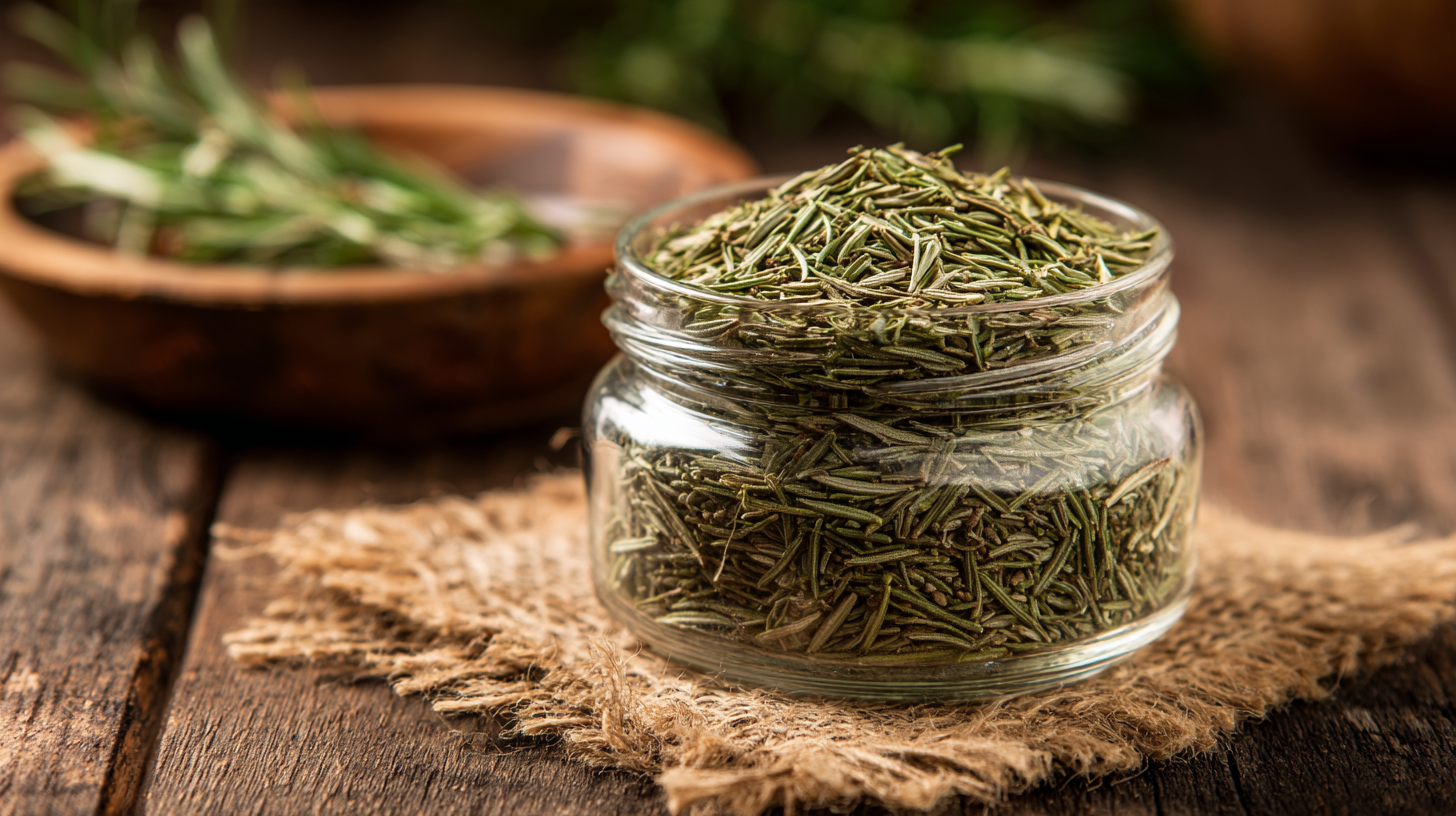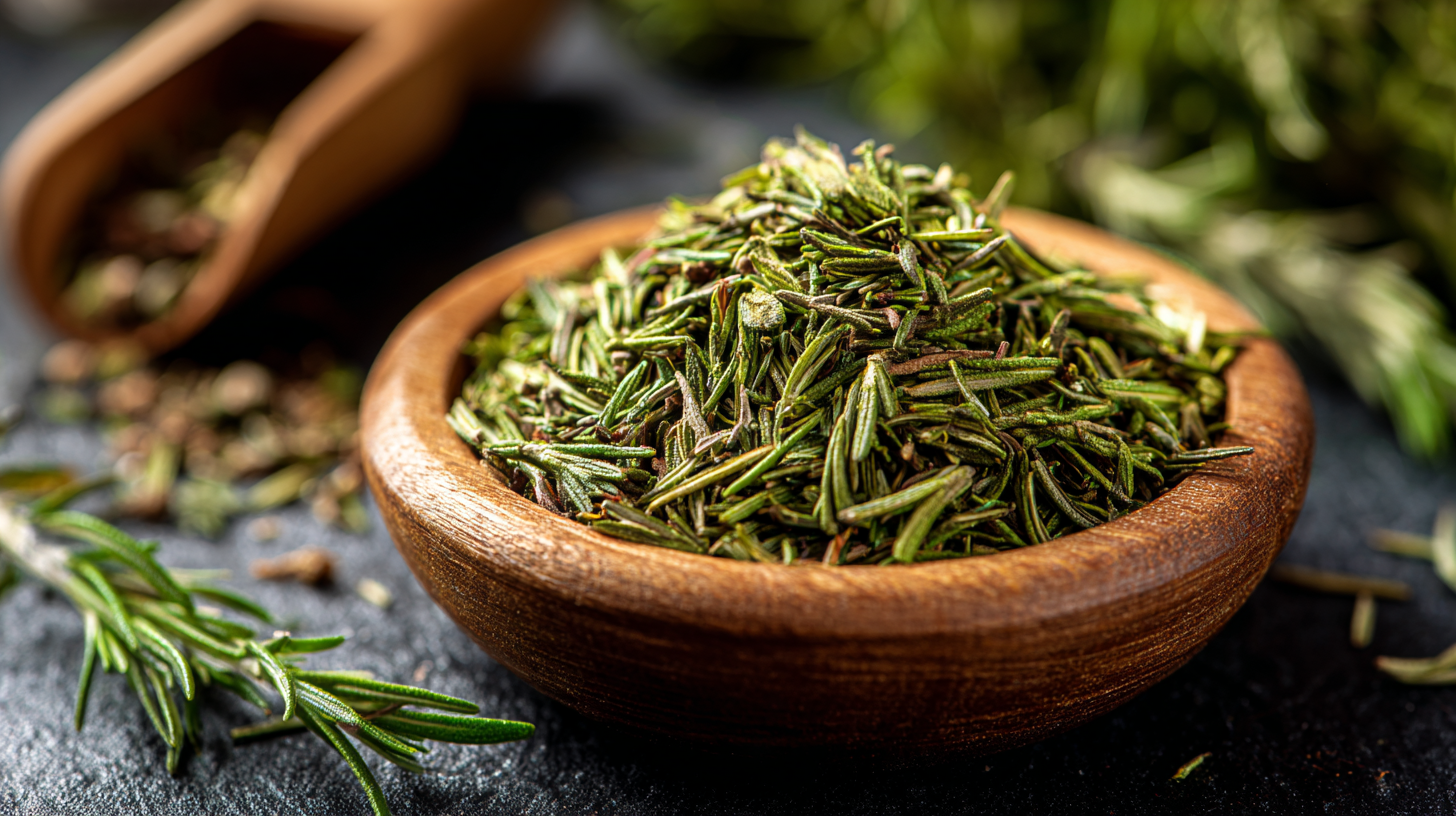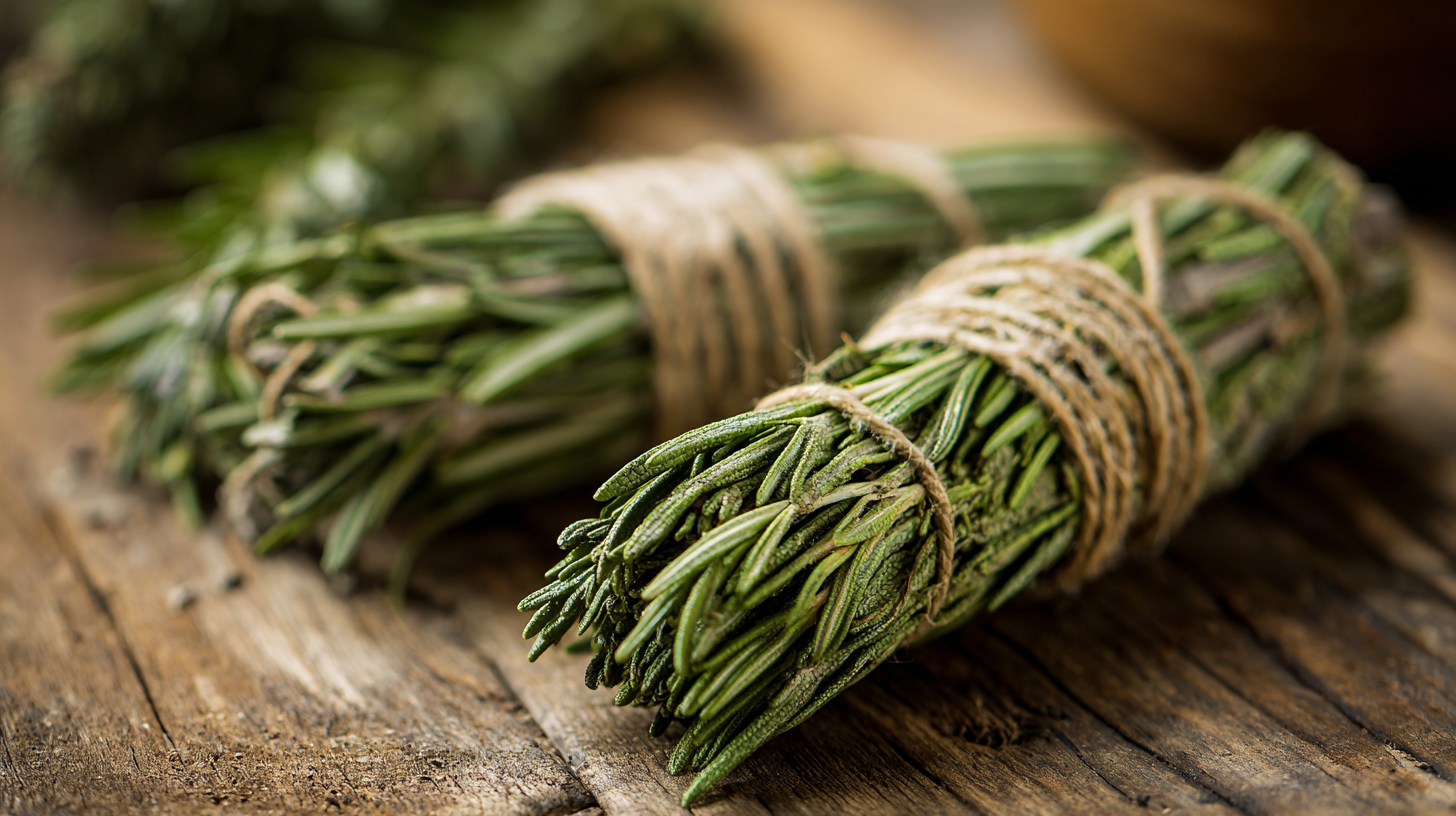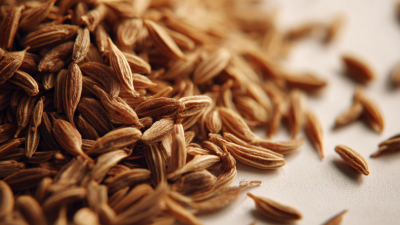 Dried Rosemary, a fragrant herb with a rich history in culinary traditions, is gaining recognition not only for its distinctive flavor but also for its remarkable health benefits, particularly its antioxidant properties. According to a study published in the Journal of Food Science, rosemary extracts exhibit significant antioxidant activity, surpassing that of many commonly used herbs and spices. This is largely attributed to its high concentration of rosemarinic acid and various phenolic compounds, which play a pivotal role in neutralizing free radicals in the body. Furthermore, the global spice market is projected to reach USD 20 billion by 2026, with rosemary being one of the standout ingredients due to its versatility in cooking and its potential health advantages. As consumers become more health-conscious, the use of Dried Rosemary not only enhances the flavor profile of various dishes but also contributes to a balanced diet filled with antioxidants.
Dried Rosemary, a fragrant herb with a rich history in culinary traditions, is gaining recognition not only for its distinctive flavor but also for its remarkable health benefits, particularly its antioxidant properties. According to a study published in the Journal of Food Science, rosemary extracts exhibit significant antioxidant activity, surpassing that of many commonly used herbs and spices. This is largely attributed to its high concentration of rosemarinic acid and various phenolic compounds, which play a pivotal role in neutralizing free radicals in the body. Furthermore, the global spice market is projected to reach USD 20 billion by 2026, with rosemary being one of the standout ingredients due to its versatility in cooking and its potential health advantages. As consumers become more health-conscious, the use of Dried Rosemary not only enhances the flavor profile of various dishes but also contributes to a balanced diet filled with antioxidants.
Dried rosemary is not only a flavorful culinary herb but also a powerhouse of antioxidants that contribute to its numerous health benefits. The key compounds found in dried rosemary include rosmarinic acid, carnosic acid, and essential oils like cineole and camphor. These antioxidants help combat oxidative stress in the body, potentially reducing inflammation and lowering the risk of chronic diseases. Carnosic acid, in particular, has been shown to protect brain health by preventing neurodegeneration.
In cooking, dried rosemary enhances a wide range of dishes, from hearty stews to roasted meats and vegetables. It pairs exceptionally well with garlic, lemon, and olive oil, making it a versatile addition to Mediterranean diets. To maximize its flavor and antioxidant properties, try to add dried rosemary early in the cooking process. This allows the herb to infuse its aromatic oils into the dish fully, elevating the overall taste experience.
Tips: When using dried rosemary, crush it between your fingers before adding it to recipes to release its essential oils more effectively. Additionally, consider incorporating rosemary into marinades or salad dressings for a fragrant and health-boosting flavor. For a unique twist, infuse olive oil with dried rosemary to create a delicious dipping oil for bread.
 Rosemary, a robust herb often celebrated for its culinary applications, is also a powerhouse of antioxidants that play a crucial role in health maintenance. Rich in compounds such as rosmarinic acid and carnosic acid, rosemary has been found to mitigate oxidative stress by combating free radicals in the body. According to a study published in the "Journal of Agricultural and Food Chemistry", rosemary extract demonstrated a significant capacity to neutralize free radicals, suggesting its potential as a valuable ally in preventing oxidative damage that contributes to chronic diseases, including cancer and heart ailments.
Rosemary, a robust herb often celebrated for its culinary applications, is also a powerhouse of antioxidants that play a crucial role in health maintenance. Rich in compounds such as rosmarinic acid and carnosic acid, rosemary has been found to mitigate oxidative stress by combating free radicals in the body. According to a study published in the "Journal of Agricultural and Food Chemistry", rosemary extract demonstrated a significant capacity to neutralize free radicals, suggesting its potential as a valuable ally in preventing oxidative damage that contributes to chronic diseases, including cancer and heart ailments.
In addition to its antioxidant properties, rosemary is commonly used in cooking, adding depth and flavor to a variety of dishes. The health benefits extend beyond taste; research from the "American Journal of Clinical Nutrition" notes that regular consumption of antioxidant-rich foods like rosemary can lead to improved overall health and may even support cognitive function. Incorporating dried rosemary into meals not only enhances flavor but also provides a simple way to boost the antioxidant content of your diet, making it a fantastic choice for health-conscious individuals.
Dried rosemary is more than just a fragrant herb; it’s a versatile ingredient that can significantly enhance your culinary experience. This herb not only adds a robust flavor to meats, soups, and stews but also pairs wonderfully with vegetables, breads, and roasted dishes. Its distinct aroma can elevate simple meals into gourmet creations, making it a staple in many kitchens. For those looking to boost the nutritional value of their dishes, dried rosemary offers essential nutrients, including antioxidants, which can contribute to overall health.

Tips for using dried rosemary include crushing the leaves between your fingers before adding them to your dish, which releases their essential oils and maximizes flavor. Additionally, consider infusing olive oil with dried rosemary to create a delicious dressing or marinade. Finally, don’t hesitate to experiment: combine dried rosemary with garlic and lemon for a delightful seasoning mix that beautifully complements grilled chicken or roasted potatoes.
Dried rosemary, with its robust flavor and aromatic profile, not only elevates culinary dishes but also boasts impressive antioxidant properties. Recent studies have highlighted that rosemary contains high levels of rosmarinic acid and carnosic acid, making it one of the top contenders among culinary herbs. According to a report by the Journal of Agricultural and Food Chemistry, rosemary can provide significant antioxidant activity, with its capacity to scavenge free radicals being substantially higher than that of common herbs like thyme and oregano.
When comparing dried rosemary to other culinary herbs, its antioxidant capacity emerges as particularly noteworthy. For example, a study in the journal Food Chemistry indicated that dried rosemary exhibits antioxidant levels exceeding those of basil and parsley. This superiority can be attributed to its unique phytochemical composition, which includes a variety of flavonoids and phenolic compounds. This makes rosemary an excellent addition not only for flavor enhancement but also for health benefits, serving as a natural preservative and a complementary agent in nutraceutical applications. As culinary preferences lean toward healthier ingredients, the inclusion of dried rosemary may not only contribute flavor but also promote overall wellness.
Dried rosemary is not only a flavorful culinary herb but also a potent source of antioxidants, making it a valuable addition to any diet. To fully reap its health benefits, integrating dried rosemary into your cooking is essential. One simple way to do this is by incorporating it into marinades and rubs for meats and vegetables, enhancing both the flavor profile and nutritional value of your meals. Additionally, steeping dried rosemary in warm water creates a fragrant herbal tea, offering a soothing beverage rich in antioxidants.
Another effective method to maximize the benefits of dried rosemary is by adding it to soups, stews, or roasted dishes. The slow cooking process allows the herb to release its essential oils, which contribute to its aromatic and healthful properties. For those looking to boost their immune system, consider mixing dried rosemary into salad dressings or sprinkle it over roasted nuts. These versatile applications not only enhance the taste of your food but also ensure that you are incorporating this nutritious herb into your daily diet seamlessly.
This bar chart illustrates the antioxidant activity of dried rosemary compared to other commonly used dried herbs. Dried rosemary has the highest antioxidant activity, making it a valuable addition to your culinary practices for health benefits.






